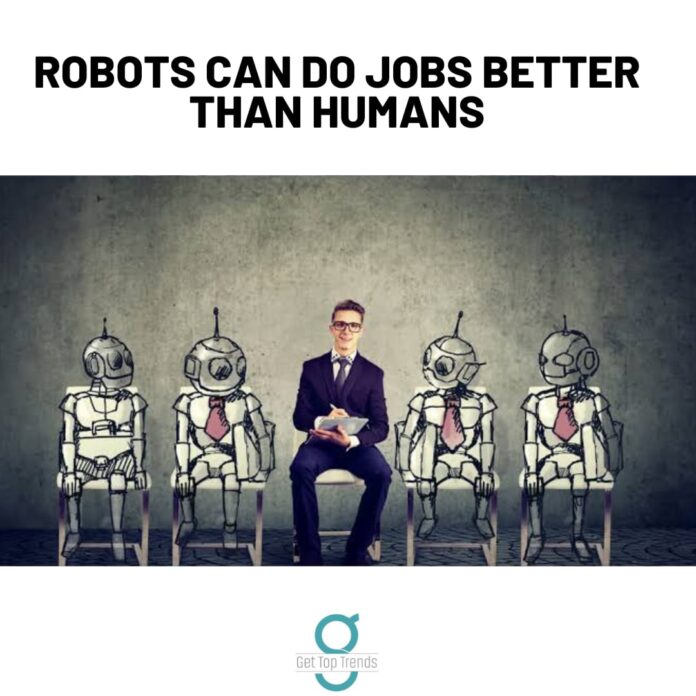What Jobs Can Robots Do Better Than Humans?
In our tech-driven world, robots are changing the way we work. And while they can’t do every job, they are becoming increasingly capable of performing tasks that were once thought to be impossible for anything without a human mind.
So if you’re wondering what jobs robots can do better than humans, the answer is a lot! From surgeons to farmers and everything in between, robots have been taking over more and more labor-intensive tasks. But just because a robot can do the job doesn’t mean it should. Especially in certain fields like healthcare, where human judgment still matters most.
Robots Can Do Better Jobs! In this article, we’ll explore what jobs robots can do better than humans (and why it matters) so that you can get a better sense of how robotics is reshaping the workplace as we know it.
Uses for Robotics in Manufacturing

Technology is changing the world! Robotics is quickly becoming an important part of the manufacturing industry. Automated machines are capable of doing the most tedious and labor-intensive tasks with greater speed, accuracy, and consistency than their human counterparts.
From simple assembly line jobs such as sorting and packing items to more complex tasks such as welding and 3D printing, robots can dramatically reduce production costs and create more consistent products.
Robots can also be used for dangerous jobs that would otherwise be hazardous for humans to do. Mining operations use robots to search for valuable ore deposits and toxic waste disposal sites use them for safely disposing of dangerous materials.
Robots also have a multitude of applications in the medical field from performing surgeries to testing drugs on laboratory animals.
Furthermore, robotics is increasingly being utilized in transportation and logistics as well. Autonomous vehicles are already being tested in some cities to deliver products faster and more efficiently than traditional vehicles. In addition, drones are increasingly being used to deliver packages across the world reducing delivery times significantly.
The possibilities are truly endless when it comes to what robotics can do better than humans!
The Impact of Robotics on Society

Robots have been around for decades already, gradually entering more and more industries, and they’re only becoming more prevalent. But why? What are the advantages of robots over humans?
Well, in short, robots can work with extreme precision and reliability. They’re typically built for specific tasks like welding and packaging, so they can carry out certain monotonous tasks faster and more effectively than a human can.
By relieving humans of this kind of low-skill labor, robots are freeing us up for jobs that require more creativity and ingenuity. This could benefit our economy in the long run by allowing us to focus on higher-skilled, value-added professions that would bring in a greater economic return.
Ultimately, robotics has the potential to revolutionize whole industries and create an entirely new world for us to explore. But it’s important to remember that robots are still tools made by people, which means that how we use them will determine how successful they become.
Exploring the Future of Robots and AI

As technology continues to evolve, so does the potential of robots and Artificial Intelligence (AI). The future is here. Now you can get a glimpse of what jobs robots are capable of doing better than humans.
- Automation
In many cases, automation is a great option for processes that require repetition. Specialized robotic arms can move with precision and strength far beyond what a human could — think of repetitive tasks like assembly line work or even woodworking. In many cases, these kinds of actions are much faster and more efficient when performed by robots.
- Machine Learning
Robots are also great at mundane or hazardous tasks that humans wouldn’t want to do or couldn’t do safely. For instance, machines can be taught to detect objects in images via machine learning algorithms, while humans would need to manually check each image — a task that takes up precious time and resources. By integrating AI into robotics, you can make robots act autonomously in complex environments — like exploring the bottom of the ocean floor or navigating through dangerous terrain.
- Data-Driven Decisions
Robotics and AI also can make data-driven decisions faster than humans. As robots collect more data from their surroundings, they can learn from it and make decisions based on their findings even faster than an experienced human might be able to do. As artificial intelligence becomes more advanced, we’ll likely see robots making decisions based on intuition rather than preprogrammed instructions — something that no human could ever do!
Conclusion
In conclusion, robots and artificial intelligence technology are advancing at a rapid pace and are rapidly taking over a wide range of jobs that were traditionally done by humans. However, they can’t do everything. There are still some jobs that require the creative problem-solving skills of humans, and many jobs that robots can do better are enhanced when a human works alongside a robot.
As robots and AI become more prevalent in the workplace, it’s important to understand what robots can and can’t do to ensure that they are being used responsibly and ethically. It’s also important to ensure that humans are appropriately compensated and trained for their work and that we continue to develop robots that can work with humans to create a bright future for everyone.


